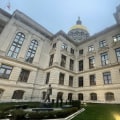Fayetteville, Georgia is a small city located in Fayette County, just south of Atlanta. With a population of around 17,000 people, it may not seem like a hub for political activism. However, the history of political advocacies in Fayetteville tells a different story.
The Early Years
The city of Fayetteville was founded in 1823 and was originally known as "Fayette Courthouse." It was named after the Marquis de Lafayette, a French aristocrat and military officer who played a crucial role in the American Revolution. In its early years, Fayetteville was primarily an agricultural community, with cotton being the main crop. During this time, political advocacies were not a major focus in Fayetteville.The city was still developing and most residents were focused on building their homes and businesses. However, as the city grew and more people moved in, political discussions and debates became more common.
The Civil Rights Movement
In the 1950s and 1960s, the Civil Rights Movement swept across the United States. This movement aimed to end racial segregation and discrimination against African Americans. While larger cities like Atlanta and Birmingham were at the forefront of this movement, Fayetteville also played a role. In 1961, a group of African American students from Fayette County High School staged a sit-in at a local restaurant that refused to serve them.This event sparked conversations about racial equality and led to the formation of the Fayette County NAACP chapter in 1963. Throughout the 1960s, there were several protests and demonstrations in Fayetteville in support of civil rights. These events brought attention to the city and its residents' commitment to equality and justice.
The 1970s and 1980s
In the 1970s and 1980s, Fayetteville experienced significant growth and development. The city's population nearly doubled, and new businesses and industries were established. With this growth came a shift in the political landscape. In 1973, the Fayette County Democratic Party was formed, and it quickly became the dominant political party in the city.This was a significant change from the previous decades when politics were not a major focus in Fayetteville. During this time, there were also several environmental advocacies in Fayetteville. In 1974, a group of residents formed the Fayette County Conservation Association to protect the county's natural resources. They successfully fought against a proposed landfill and helped establish the county's first recycling program.
The 1990s to Present
In the 1990s, Fayetteville continued to grow and develop. The city saw an increase in diversity, with more people of different races and backgrounds moving in.This diversity brought about new perspectives and ideas, leading to more political advocacies. In 1996, the Fayette County Republican Party was formed, providing an alternative political voice in the city. This led to more debates and discussions about various issues, including taxes, education, and healthcare. One of the most significant political advocacies in recent years was the fight against a proposed coal-fired power plant in Fayette County. In 2008, a group of concerned citizens formed the "No New Coal Plant" organization to oppose the plant's construction. After years of protests and legal battles, their efforts paid off when the project was ultimately canceled in 2015.
The Impact of Political Advocacies
The history of political advocacies in Fayetteville has had a significant impact on the city and its residents.These advocacies have brought about change and progress, from fighting for civil rights to protecting the environment. They have also helped shape the city's political landscape, with both major political parties having a presence in Fayetteville. This diversity of opinions and ideas has led to healthy debates and discussions, ultimately benefiting the community.





